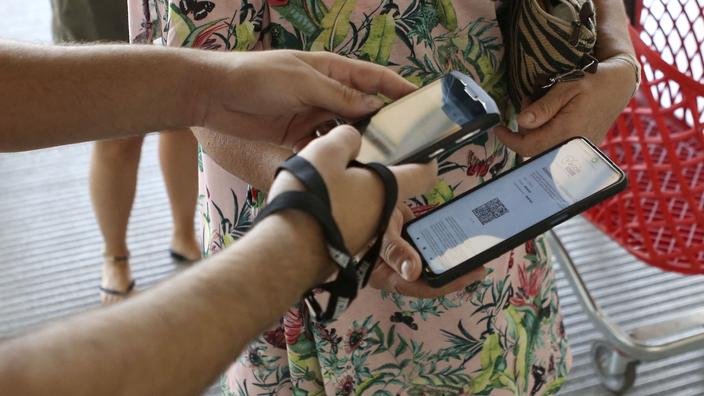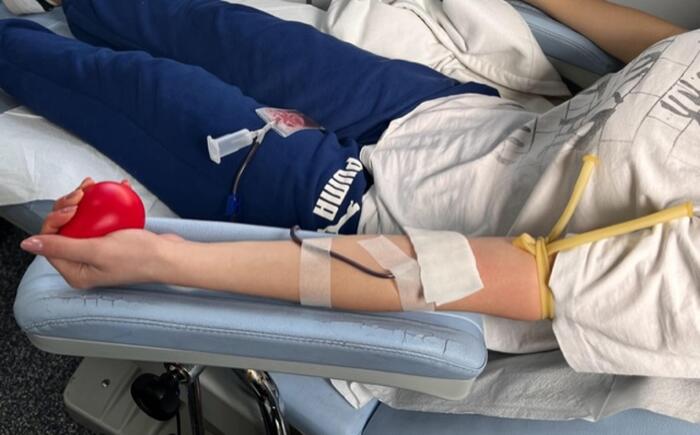“The
whole challenge in the weeks and months to come is to see how to keep tools that we have seen proved their worth and which allow us to protect the French and maintain activity, and at the same time time, to see how to adapt them to the situation
”. On the set of BFM Politique, Sunday, September 19, Gabriel Attal for the first time mentioned the hypothesis of a local health pass, which would allow certain restrictions to be lifted depending on the situation in each region. Currently, around thirty departments have a "
very low
"
incidence
rate
of less than 50 cases per 100,000 inhabitants, argued the government spokesperson.
Before him, Emmanuel Macron had already hinted that an easing of restrictions was under consideration. "
As soon as the sanitary conditions allow it and, in my opinion, when I see the figures, it will not come so late
", we will be able to "
allow
ourselves
, in the territories where the virus circulates less quickly, to lift certain constraints and to live again normally
”, announced Thursday the President of the Republic. In an interview given to Le
Parisien
on Saturday
, Olivier Véran wanted to be just as optimistic, explaining that "
we have reason to hope that the worst of the crisis is over
", even if he specified that it was still "
too early to relax the measures
”.
Read alsoCovid-19: 50 million primary vaccines ... And still how many French people to convince?
While the application of the health pass must officially end on November 15, but a bill to extend its use will be presented on October 13 in the Council of Ministers, the executive therefore plans to re-engage in a territorial approach of the fight against the epidemic.
In this sense, Gabriel Attal announced that the hypothesis of a regionalized health pass should “
probably
” be studied on Wednesday, during a Defense Council.
A possibility that divides specialists.
The incidence rate, a bad indicator?
"
There are still a lot of viruses circulating,
" notes epidemiologist Catherine Hill, former head of the biostatistics and epidemiology department at the Gustave-Roussy Institute. If the peak of the fourth wave is now behind us, the specialist considers that the situation is not yet good enough to consider easing restrictions, even in the most preserved areas: “
Yesterday, we noticed 94 arrivals in intensive care by day, on an average of seven days. The peak on August 23 was 207. If we go back to the last trough, in mid-July, this figure dropped to 23
”, she observes, by way of comparison. In addition, Catherine Hill believes that "
the authorities are monitoring the epidemic with the wrong indicator
", That of the incidence rate, which consists in"
dividing the number of cases found thanks to the tests by the number of inhabitants
".
"
Which tells us more about the tests than the actual circulation of the virus,
" she explains.
"
The incidence rate can be skewed, because people will not necessarily continue to be screened
" if there is no more health pass, abounds Jonathan Roux, epidemiologist at the École des Hautes Etudes en Santé public.
Read alsoCovid-19: who are the last "resistant" to the health pass?
If this regionalization of the health pass "
is a logical answer when we look at the figures
", the scientist also warns against the "
perverse effect
" that could result from it. “
It can slow down vaccination even more. If we stop the pass, people who are not vaccinated can tell themselves that it is over. However, we must continue to be vaccinated,
”he warns. In addition, Jonathan Roux fears an "
exodus effect
", as "
there was with the curfew last year
", even if it will undoubtedly be "
less massive
". For Catherine Hill, this is a real problem: “
The anti-pass and anti-tax devices from the department next door will go to restaurants and to the cinema in the department next door,
”she warns.
The arrival of cold as an accelerating potential
The fact remains that today, if the epidemic decreases thanks to the combination of vaccination and preventive measures such as the health pass or the mask, “
human factors
” will be taken into account in the coming weeks. Among them, "
the resumption of activity, the start of the school year and the arrival of the cold, which will push people to stay indoors and to ventilate less
", lists the infectious disease specialist Anne-Claude Crémieux, professor of diseases. infectious diseases at the Saint-Louis hospital in Paris. These variables "
can modify the trajectory of the epidemic, and this without adding a possible viral factor, such as a new variant, which is still to this day completely unpredictable
", adds the one who is also a corresponding member of theNational Academy of Medicine. "
Last year, the second wave started in October, with the arrival of autumn,
”also recalls Jonathan Roux.
Read alsoCovid-19: should we fear the arrival of winter?
Finally, our three experts agree on one point: "
The decisions are more political than health
", as summarized by Anne-Claude Crémieux, for whom "
the government is trying to balance the health, political and economic aspects
". Catherine Hill goes even further: “
We can suspect that the use of a local health pass is an electoral maneuver, to please the anti-pass. In any case, it is not a public health maneuver
”. “
From an epidemiological point of view, we would have to wait a bit, but the decision is taken by the politicians
», Adds Jonathan Roux. He pleads for the abolition of the sanitary pass in places of cultivation, in the departments where the incidence rate is the lowest. But for its maintenance "
in places at high risk, such as bars and restaurants, while keeping the mask everywhere
". “We
will have to consider a reduction in measures, but when? Not necessarily now, because we are arriving in a risk zone
, ”concludes the epidemiologist. The ball is now in the government's court.












/cloudfront-eu-central-1.images.arcpublishing.com/prisa/KMEYMJKESBAZBE4MRBAM4TGHIQ.jpg)


